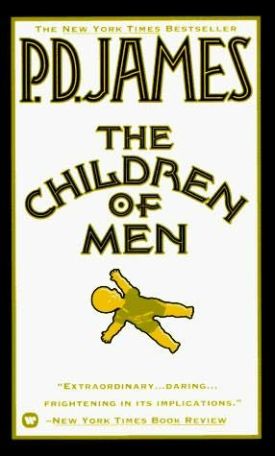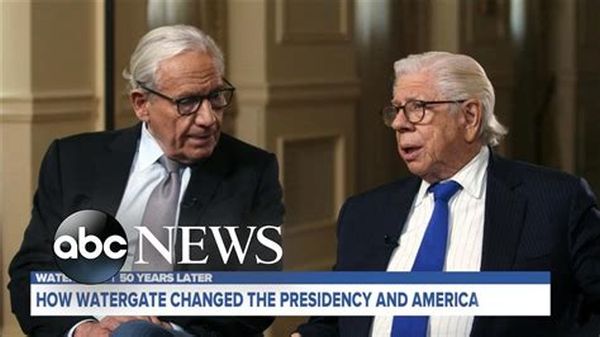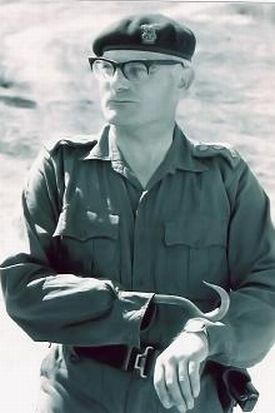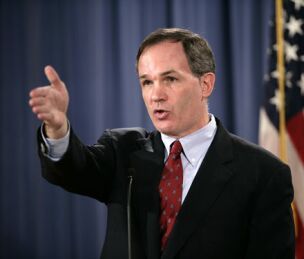Our Childless Dystopia
From The New AtlantisP.D. James’s novel of 1993, Children of Men, was a far-seeing if not entirely satisfactory look at the world we know through the lens of futuristic-apocalyptic fiction — which is always an iffy thing and all the more so if the apocalyptic future is near enough to be noticed when it doesn’t happen. And yet, in a way Miss James’s future has happened. Her version of the eschaton is the sudden inability of human beings to reproduce themselves, beginning in 1995. This is the year Omega and the last people to be born, now in their 20s as the novel begins in 2021, are known as Omegas. As we now know, 1995 was remarkable for many things (the 100 days of the first Republican congress in 40 years; the Oklahoma City bombing, Steve Fossett’s traverse of the Pacific Ocean in a balloon), but not for the demographic doom of the human race. And yet Children of Men was a lot more accurate than most eschatalogical fiction, for it presents an exaggerated version of a problem — namely the gradual depopulation of the developed world through below-replacement fertility rates — that in the years since it came out has begun to seem to some rather scarily unexaggerated.
Miss James does not attempt to explain her more drastic collapse of fertility, vaguely suggesting that it might be caused by some kind of sperm-killing virus. Writing in the first person as her hero, an Oxford don called Theo Faron, she claims that “We are outraged and demoralized less by the impending end of our species, less even by our inability to prevent it, than by our failure to discover the cause. Western science and Western medicine haven’t prepared us for the magnitude and humiliation of this ultimate failure.” Well, that may be how an Oxford don sees the world, but she also makes it clear that, to most of the people in her fictional Britain, the anguish of being unable to reproduce is very much greater than anything else and certainly greater than any regrets that are apparent (so far) for our own world of largely voluntary infertility. Perhaps this is because we do know the cause, even though we are equally reluctant to delve into it. For anything that might call into doubt the feminist-led cultural disparagement of traditional female roles — not only motherhood but the whole panoply of activities that used with good reason to go under the name of “home-making” — and the attempt to replace them with male or unisex ones remains an almost-taboo subject.
There is no mention of any of that sort of infertility in Children of Men. On the contrary, childless women in the Jamesian universe are in the habit of keeping dolls and dressing them and taking them out for walks in prams. They live in a world in which mothering appears by its absence to be still as socially approved as it was in the 1950s. Of course, this is doubtless on account of its unattainability, but if that unattainable longing has produced in any other way a counter-revolution against feminist ideas of social progress she does not say so. It certainly seems to have produced none against the sexual revolution, since in 2021 Britain’s relatively benign fascist government — presided over by a cousin of Theo Faron’s who calls himself “the Warden of England” and his hand-picked “Council” — operates state-sponsored pornography shops, which it is one of the demands of the tiny dissident group called the Five Fishes to close down.
The others include reform of a penal colony on the Isle of Man where, apparently, unspeakable horrors are tolerated by the authorities because they are visited by one lot of criminals upon another, and the ending of the practice of state-sponsored mass suicide known as the Quietus. There is also a demand for full citizenship for immigrant guest-workers or “Sojourners” who, under the Warden’s rule, are expelled from the country when they are too old any longer to function in the role of helots to the native population. But the real point about the Five Fishes is how utterly ineffectual they are. Not only are their liberal aims much less popular than the Warden’s severity — though he doesn’t hold elections anymore, it is conceded that he would win in a landslide if one were held — but the very idea of dissidence has died out of the population with the advance of its aggregate age.
The central insight of the novel is that all ideas of social improvement and reform, all justice, hope and love depend on the existence of future generations for whose sake all the good that we do, if any, is ultimately done. “It was reasonable to struggle, to suffer, perhaps even to die, for a more just, a more compassionate society,” writes P.D. James, “but not in a world with no future where, all too soon, the very words ‘justice’, ‘compassion’, ‘society’, ‘struggle’, ‘evil’, would be unheard echoes on an empty air.” Thus, it is not just coincidental that the parents of the first child born in 26 years, are leading the only movement for reform. Without the ability to bear children, Miss James tells us, we also lose the ability to care about anything but our own comfort and safety — which is what the Warden of England promises in return for his absolute and unquestioned power. There is much to be said for this view of things, but I wonder if it isn’t possible that it may work the other way around? Do we, that is, when we start to care only for our own comfort and safety lose if not the ability then the need or desire to reproduce — which can of course be just as deadly to the culture in which this happens, if not to the species as a whole?
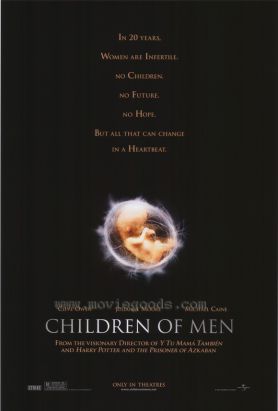 |
Either way, these are serious matters, but the new movie which is supposedly based on Miss James’s book ignores them all. In typical Hollywood style, the apocalypse is treated as nothing but an excuse for trotting out yet again that most clichéd of all movie heroes, the lone righteous man who wages his solitary struggle against a massive governmental establishment out to destroy him and/or against the breakdown of society itself. As the novel’s timid, donnish 50-something Theo Faron, Alfonso Cuarón’s movie gives us the well-muscled 40 year old action hero Clive Owen, recently edged out by Daniel Craig in the race to succeed Pierce Brosnan as the movies’ latest incarnation of James Bond. In place of the popular and strict but apparently military-less government of the Warden of England and the feral Omegas, living in the forests, it offers us a brutal thugocracy of leaderless soldiers engaged in perpetual guerrilla warfare with a rag-tag but well-armed insurgency of rebels without a cause.
In both the novel and the film, Theo acts as escort and protector to the first woman to give birth in over 20 years, but the film’s unexplained guerrilla warfare gives him many more terrifying obstacles to overcome than the novel thinks necessary — and almost no reasons either for the existence of those obstacles or for his efforts to overcome them. He is meant to be running the gauntlet of the fascist police and soldiers on the one hand and rebels on the other to get the young woman, who is about to deliver her child, to a point of rendezvous where she can be picked up by an ocean-going science lab — which is apparently inaccessible to an inexplicably navy-less central authority — called the Human Project. But why fascists and rebels alike wouldn’t simply welcome the new life and join Theo in doing all that could be done to protect it remains a mystery. At one point they actually stop fighting and gaze in awe when they realize that the first pregnant woman in decades is among them, but she passes on her way and they resume the war.
The novel’s explanation for the equivalent of the Flight into Egypt of this science-fictionalization of the Holy Family — which is not to seek the movie’s scientific savior but just to find a safe and private place to give birth — strikes me as feeble but at least it is an explanation. The novel’s Mary, named Julian, thinks the Warden is “evil” and doesn’t want to give him the benefit of a propaganda coup. Herod obviously missed a trick by Slaughtering the Innocents instead of issuing to the media a picture of himself smiling and holding the infant Jesus. The movie makes Julian (Julianne Moore) into Theo’s ex-wife and gives her child-bearing duties to a new character, Kee (Claire-Hope Ashitey), whose antecedents are as unexplained as her reasons for trying to escape the authorities. The movie does away not only with the novel’s explanation but with the Warden himself. Dark cinematic visions of our fascist and/or anarchist future — Children of Men hedges its bets by offering both — are now apparently so taken for granted that they don’t even bother to explain the political circumstances of the rise of either the fascists or anarchists.
Certainly Mr Cuarón, who directed the film and co-wrote the screenplay with no fewer than four collaborators, misses the subtlety of P.D. James’s connection between a childless future and the waning, rather than the increasing, of political passions. Yet P.D. James, who cannot be happy with such an incoherent adaptation of her novel, in a way foresaw this failure as well. For the film-makers’ mindless pessimism is an unconscious echo of the approach to the end of human-kind of Theo’s now-aged former tutor, Jasper Palmer-Smith:
On the whole, I’m glad; you can’t mourn for unborn grandchildren when there never was a hope of them. This planet is doomed anyway. . . If man is doomed to perish, then universal infertility is as painless a way as any. And there are, after all, personal compensations. For the last sixty years we have sycophantically pandered to the most ignorant, the most criminal and the most selfish section of society. Now, for the rest of our lives, we’re going to be spared the intrusive barbarism of the young, their noise, their pounding, repetitive, computer- produced so-called music, their violence, their egotism disguised as idealism. My God, we might even succeed in getting rid of Christmas, that annual celebration of parental guilt and juvenile greed. I intend that my life shall be comfortable, and, when it no longer is, then I shall wash down my final pill with a bottle of claret.
The movie makes Jasper, played by Michael Caine, into one of its few heroes rather than a sad old man whose self-important content with the idea that the world should end with himself was surely intended to be repellent — just as the mention of Christmas was meant to look ironically ahead to the echoes of the Christmas story to come in Theo’s and Julian’s odyssey. Such a misunderstanding could itself almost be said to be a confirmation of the novel’s link between the end times and our culture’s Jasper-like state of self-satisfied hostility to the innocence and idealism as well as the awkwardness and rambunctiousness of the young.
Discover more from James Bowman
Subscribe to get the latest posts to your email.

